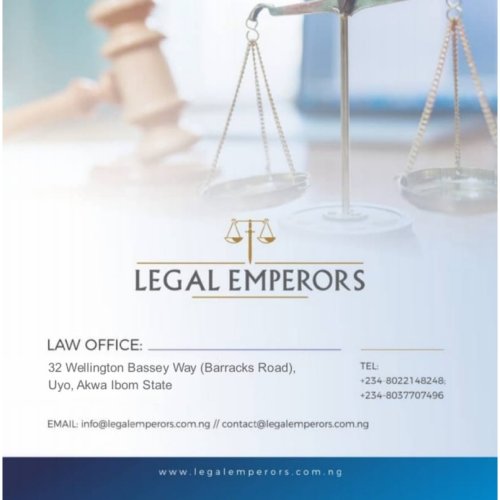Best Estate Planning Lawyers in Nigeria
Share your needs with us, get contacted by law firms.
Free. Takes 2 min.
Or refine your search by selecting a city:
List of the best lawyers in Nigeria
Nigeria Estate Planning Legal Questions answered by Lawyers
Browse our 1 legal question about Estate Planning in Nigeria and read the lawyer answers, or ask your own questions for free.
- Inherited land
- My elder brother sold our late father's land without telling me. We are the only two surviving sons.We live in our father's compound. He is married with two kids. I'm not married. Should I arrest him or the buyer? how do I get justice
-
Lawyer answer by Recososa Law Firm
Hello: In a situation like yours, under Philippine law, the land left behind by your father forms part of his estate. As heirs, you and your brother have what we call co-ownership under the Civil Code of the Philippines. This...
Read full answer
About Estate Planning Law in Nigeria
Estate Planning in Nigeria entails the process of arranging the management and disposal of a person's estate during their life and at their death. Estate planning is vital to ensure that an individual's wishes regarding their property and family are honored and that they can minimize issues during estates' administration. Challenges like family disputes and delays in accessing the deceased's assets can be mitigated with thorough planning. Estate planning often involves creating a will, setting up trusts, and designating beneficiaries for life insurance and other financial benefits.
Why You May Need a Lawyer
Hiring a lawyer in estate planning can be beneficial in several situations, such as:
- Drafting a Will: Professional advice ensures that the will is legally sound and aligns with your wishes.
- Creating Trusts: Lawyers assist in setting up trusts to control how and when beneficiaries receive assets.
- Navigating Tax Implications: Lawyers provide insight into tax obligations and methods of reducing taxes on estates.
- Complex Family Dynamics: Legal guidance can help navigate issues like blended families and second marriages.
- Probate Process: Assistance during the probate process can help avoid potential legal pitfalls.
- Dispute Resolution: Lawyers can mediate and resolve disputes between heirs.
Local Laws Overview
Nigeria's estate planning is influenced by several laws, including:
- The Wills Act: Governs the creation and execution of wills in Nigeria. It applies in various jurisdictions, with some variations.
- Administration of Estates Law: Provides a framework for the distribution of estates of deceased persons who die intestate (without a will).
- The Probate Registry: Probate law manages the registration of wills and the administration of estates.
- Customary and Sharia Laws: In certain regions, estate planning can also be subject to customary or Sharia laws, depending on the deceased's marital and religious background.
Frequently Asked Questions
What is Estate Planning?
Estate planning is the process of arranging for the disposal of an individual's estate, usually through the drafting of a will, trusts, and other mechanisms to ensure assets are distributed according to their wishes.
Do I Need a Lawyer to Write a Will?
While it is possible to write a will without a lawyer, professional advice ensures that all legal requirements are met and can prevent future disputes or challenges to the will.
What Happens if I Die Without a Will?
If you die intestate (without a will), your estate will be distributed according to Nigeria’s intestacy laws, which may not reflect your personal wishes.
What is Probate?
Probate is the legal process of validating a will and administering the deceased's estate, ensuring debts and taxes are paid, and the remaining assets are distributed as per the will or intestacy laws.
Can a Will be Contested?
Yes, a will can be contested on various grounds, such as lack of testamentary capacity, undue influence, or improper witnessing. Legal advice is crucial in such cases.
What is a Trust?
A trust is a fiduciary arrangement where a trustee holds assets on behalf of beneficiaries. It is used to specify asset distribution and protect estate value.
How Can I Avoid Probate?
Probate can be avoided by creating living trusts, joint ownership of assets, or naming beneficiaries on accounts and insurance policies.
What Taxes Apply to Estates in Nigeria?
In Nigeria, estate taxes can vary, but they generally involve capital gains tax on property transfer and taxes on rental income derived from properties within the estate.
What Role Do Executors Play?
Executors are appointed in a will to administer the estate, ensure the deceased's wishes are followed, and manage estate affairs until final distribution.
Can Estate Planning be Updated?
Yes, estate planning documents should be reviewed regularly, especially after major life events, to ensure they still reflect your wishes and current laws.
Additional Resources
The following resources can prove helpful for those seeking more insights on estate planning in Nigeria:
- Ministry of Justice: Provides information on legal requirements for wills and estate administration.
- Nigerian Bar Association: Offers referrals to qualified lawyers specializing in estate planning.
- Lagos State Probate Registry: Offers practical advice on probate processes and estate administration.
- The Chartered Institute of Taxation of Nigeria: Provides details on tax obligations related to estates.
Next Steps
If you are considering estate planning or require legal assistance, follow these steps:
- Identify your estate planning goals and family needs.
- Seek recommendations for a qualified estate planning lawyer in Nigeria.
- Schedule consultations to understand how each lawyer can meet your needs.
- Prepare necessary documents, such as lists of assets and liabilities, to help your lawyer create a tailored plan.
- Regularly review and update your estate plan to reflect changes in your personal situation or estate laws.
Lawzana helps you find the best lawyers and law firms in Nigeria through a curated and pre-screened list of qualified legal professionals. Our platform offers rankings and detailed profiles of attorneys and law firms, allowing you to compare based on practice areas, including Estate Planning, experience, and client feedback.
Each profile includes a description of the firm's areas of practice, client reviews, team members and partners, year of establishment, spoken languages, office locations, contact information, social media presence, and any published articles or resources. Most firms on our platform speak English and are experienced in both local and international legal matters.
Get a quote from top-rated law firms in Nigeria — quickly, securely, and without unnecessary hassle.
Disclaimer:
The information provided on this page is for general informational purposes only and does not constitute legal advice. While we strive to ensure the accuracy and relevance of the content, legal information may change over time, and interpretations of the law can vary. You should always consult with a qualified legal professional for advice specific to your situation.
We disclaim all liability for actions taken or not taken based on the content of this page. If you believe any information is incorrect or outdated, please contact us, and we will review and update it where appropriate.
Browse estate planning law firms by city in Nigeria
Refine your search by selecting a city.

















